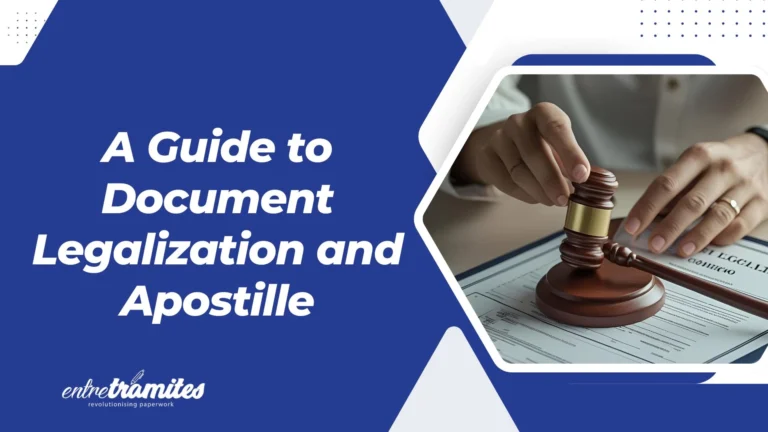Are you navigating the whirlwind of immigration procedures in Spain? You know that every piece of paper counts, and a simple mistake can halt your entire process. One of the most critical and often most confusing points is the correct legalization and apostille in Spain. Mastering this process is fundamental to ensuring that your certificates, diplomas, or birth records from your home country are valid and recognized in Spanish territory.
In this article, we will demystify document legalization and apostille, guide you step by step, and reveal the most common mistakes so you can avoid them. Our goal is to ensure your immigration procedures flow smoothly.
What are Legalization and Apostille and Why Are They Vital?
Document legalization is a procedure by which authorities certify the authenticity of the signature and seal on a document issued in another country. It is essential for a foreign document to have legal validity in Spain and to be used in procedures such as visa applications, residence authorizations, or diploma validations.
The Hague Apostille, on the other hand, is a simplified form of legalization between countries that are signatories to the Hague Convention of 1961. According to the Spanish Ministry of Justice, an apostille certifies the authenticity of the signature, title, and seal of a public document, and the stamp is directly recognized in other signatory countries.
For example, if a Venezuelan citizen needs to present their university diploma in Spain and Venezuela is part of the Convention, it will suffice to obtain the apostille in Venezuela. If the document comes from a country that is NOT a signatory (like Qatar), it will require diplomatic legalization, which is a longer and more complex process.
Common Errors When Processing Document Legalization and Apostille and How to Avoid Them
- Not verifying if your country is a signatory to the Convention. Checking this beforehand will prevent you from trying to get an apostille on a document from a non-signatory country or attempting unnecessary legalization.
- Not legalizing/apostilling the original document or using a simple photocopy. Most procedures require the original document. Copies are only valid if they are certified by a notary.
- Omitting a sworn translation. If the document is in another language, you will need a sworn translation done by a translator authorized by the Spanish Ministry of Foreign Affairs. Always attach the translation to the original document.
- Not respecting validity periods. Documents like criminal record certificates expire. Check the issue and expiration dates before apostilling/legalizing them.
- Being unaware of the competent authority. The authority varies in each country: in Colombia, the Apostille is done by the Ministry of Foreign Affairs; in Spain, the apostille is issued by the Ministry of Justice or the Legalization Service of the Ministry of Foreign Affairs.
Tips for a Successful Process
- Research thoroughly: Consult the websites of embassies/consulates and ministries (Justice or Foreign Affairs) for specific requirements.
- Organize your documents: Prepare a folder with originals, certified copies, sworn translations, and payment receipts.
- Anticipate the timeline: The time it takes depends on the Legalization Service or the Ministry of Justice.
- Use official online channels: You can apply for an electronic apostille through the electronic headquarters of the Ministry of Justice.
- Consider professional advice: If your case is complex (multiple countries involved, specific documents), a gestor or lawyer can streamline the process and help you avoid errors with your apostille in Spain.
Frequently Asked Questions (FAQs)
Does an apostille expire? The apostille itself does not expire, but the document to which it is applied does. A validated certificate may become outdated for certain procedures.
Can I get a document issued in another country apostilled from Spain? No. The apostille must be processed in the country that issued the document, even if you are in Spain.
What should I do if the document is only for informational purposes and not official? If it is not for a legal procedure, an apostille/legalization is likely not required. But if you have doubts, it’s a good idea to process it to avoid problems.
Document legalization and apostille are an inescapable component of the immigration process in Spain, but they do not have to be an insurmountable obstacle. By understanding their purpose, knowing the correct steps, and being aware of common errors, you will be one step closer to successfully completing your immigration procedures. A little attention to detail will save you time, money, and frustration on your journey.
If you need personalized assistance, at Entre Trámites we offer management and advisory services on immigration matters. You can contact us through this contact form for us to call you, or if you prefer, you can schedule a free consultation or write to us on WhatsApp.





